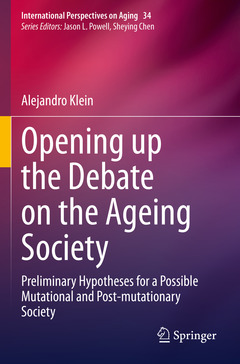Opening up the Debate on the Aging Society, 1st ed. 2022 Preliminary Hypotheses for a Possible Mutational and Post-mutationary Society International Perspectives on Aging Series, Vol. 34
Auteur : Klein Alejandro

This book documents, verifies and brings to life the issues and debates that are created around the aging society. It carefully offers a series of opinions that attempt to illuminate the fact that the aging society goes beyond aging and includes a series of changes in terms of family, social ties, relationships, and the way human beings perceive society. The book contributes substantially to the discussion of this new type of aging, the new types of families, and the new types of relationships, as well as in the application of cutting-edge analytical strategies to understand the trends and patterns of these new modes of social structures.
The book includes detailed perspectives on how decisions need to be made, mindsets need to be changed, and precautions need to be taken to positively deal with these new realities. The evidence presented in this book suggests that if this does not happen, the danger of thanato-politics appears, which, denying reality, will lead humanity into difficult labyrinths, perhaps without any "Ariadne's thread" that will allow a glimpse of the way out.The translation from Spanish to English was done with the help of artificial intelligence (machine translation by the service DeepL.com). A subsequent human revision was done primarily in terms of content.
Chapter 1. Note about the methodological and conceptual use of this book.- Chapter 2. Old age no longer anticipates the unpostponable sign of death. The new social and identity models of older adults.- Chapter 3.The new dialogues of grandparenthood from the social precariousness and the familiar bewilderment.- Chapter 4. The older adult, the social bond in transition and the exhaustion of the transmission capacity.- Chapter 5. Change to the "social order" from the deconstruction imposed by the aging society: social relations that become anachronistic, social relations that are idealized, social relations that are denigrated.- Chapter 6. Ageism, disability and healthy ageing as stereotypizing paradigms.- Chapter 7. Old people, coronavirus and the precarious culture of the precarious.- Chapter 8. Tanatopolitics, totalitarianism and coronavirus: a tour of excesses.- Chapter 9. Insolvable dilemmas of a bewildered world.- Chapter 10. Preliminary hypotheses for a probability called mutational society.- Chapter 11. Unstable reasons for a possible post-mutationary society.
Dr. Alejandro Klein is a Research Professor at the Department of Governance & Development, Social Sciences and Humanities Faculty at the University of Guanajuato, Mexico, and Associate Professorial Fellow at The Oxford Institute of Population Ageing, UK. A trained psychologist, Dr Klein researches the socio-demographic issues facing the ageing populations of Latin America. He has a wealth of teaching experience at the undergraduate and graduate levels including supervision of masters and doctoral degrees.
Reviews the consequences of the ageing society
Provides an epistemological view on the subject of old age
Discusses the future trends of the ageing society
Date de parution : 08-2023
Ouvrage de 156 p.
15.5x23.5 cm
Date de parution : 08-2022
Ouvrage de 156 p.
15.5x23.5 cm
Thèmes d’Opening up the Debate on the Aging Society :
Mots-clés :
new familiar and couple relationships; Traditional gerontology perspective; future of the humanity; epistemological view on old age; future trends of the ageing society; consequences of the ageing society; new social and identity models of older adults; social precariousness; family disarray and old age; Older people and COVID-19; Bayesian estimation methods; post-mutational society; aging population



